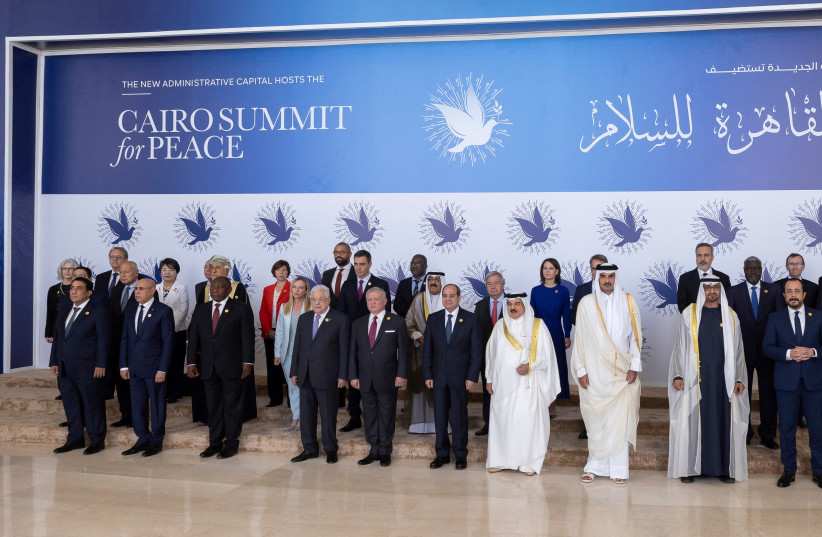The UAE, Saudi Arabia, and other countries in the Gulf are increasing aid to Gaza. This is important because many civilians in Gaza have left Gaza City and its environs to head to the southern part of the Gaza Strip for safety. Israel has encouraged the civilians to leave the north since mid-October after Hamas launched an attack on Israel, massacring 1,200 people.
According to Arab News the first convoy from Saudi Arabia arrived in Gaza on Sunday. “The first aid convoys sent by the King Salman Humanitarian Aid and Relief Center to Gaza crossed the Rafah border crossing into the enclave on Sunday,” the Saudi Press Agency reported. The humanitarian support from Riyadh includes supplies for shelters as well as other aid. It was begun under the direction of King Salman and Crown Prince Mohammed bin Salman earlier this month, reports say. “Meanwhile, a fourth Saudi relief plane carrying aid from the Kingdom to Gaza arrived at El-Arish International Airport in Egypt on Saturday,” Arab News said.
This comes after Saudi Arabia hosted an important Arab League meeting with Islamic countries to discuss Gaza. Iran and Syria’s presidents both participated. Iran wants a more extreme hard line against the US and Israel and has mobilized proxies in the region to destabilize the Middle East. Saudi Arabia is playing an important role in stabilization and in seeking compromise. “The initiative is in line with Saudi Arabia’s longstanding commitment to supporting the Palestinian people during times of crisis,” Arab News noted.
The UAE is also playing an important role. Last week The National News in the UAE reported that “the UAE has sent a further six planes carrying supplies and equipment to support the construction of a field hospital in the Gaza Strip.” The report said that the planes had departed Abu Dhabi last Tuesday and arrived in El Arish. The UAE support is dubbed Gallant Knight 3 humanitarian operation. The UAE is establishing a 150-bed field hospital. Five planes brought equipment for it last week. This is important because many hospitals in northern Gaza are now being evacuated. This includes the Rantisi and Nasr hospitals, as well as Shifa and Quds hospitals.
According to Al-Ain media on Monday, the UAE has sent “64 planes to Gaza relief, including 56 planes sent during the last 7 days, with an average of 8 planes per day, and among those aircraft were 32 aircraft as part of Operation ‘Galant Knight 3’ to transport supplies for a field hospital that the UAE intends to establish in Gaza.” The report noted that 1,039 tons of aid had been collected for Gaza and 24,000 volunteers have been helping.

UAE to open field hospital in Gaza
Gulf News also noted that “in parallel with these humanitarian initiatives, the UAE is making non-stop diplomatic and political efforts around the clock, in implementation of the directives of Sheikh Mohammed bin Zayed Al Nahyan, President of the United Arab Emirates.” President Sheikh Mohamed bin Zayed Al Nahyan, has supported “a comprehensive Emirati field hospital is to be established in the Gaza Strip to deliver essential medical support to Palestinians. The initiative is part of the 'Gallant Knight 3' humanitarian operation, which Sheikh Mohamed ordered to be implemented yesterday,” the report said.
The field hospital will include “departments for general surgery, orthopaedics, paediatrics, and gynaecology, in addition to anaesthesia and intensive care units catering to both children and adults. The facility will also house clinics for internal medicine, dentistry, psychiatry, and family medicine.”
Meanwhile, Saudi Arabia’s Foreign Minister Prince Faisal Bin Farhan arrived in Muscat in Oman to co-chair the first meeting of the Saudi-Omani Coordination Council. He met with his Omani counterpart Sayyid Badr Albusaidi. “The two counterparts will discuss, during the Saudi-Omani Coordination Council, enhancing the relations between Saudi Arabia and Oman, in a way that achieves the aspirations of the two countries’ leaders for further progress and prosperity,” the Saudi Gazette noted.
Bahrain also sent aid to Gaza in late October. Over the weekend Jordanian King Abdullah and Bahrain Crown Prince and Prime Minister Salman bin Hamad Al Khalifa met to discuss Gaza and humanitarian issues. “Discussions at the meeting, held on the sidelines of the Joint Arab-Islamic Extraordinary Summit in Riyadh and attended by Crown Prince Hussein, reaffirmed the importance of intensifying Arab and Islamic efforts and moving forward with active players and regional partners to stop the war and sustain the delivery of medical and relief aid, according to a Royal Court statement,” The Jordan Times said. The Jordanian King stressed the importance of security and stability in the region.
